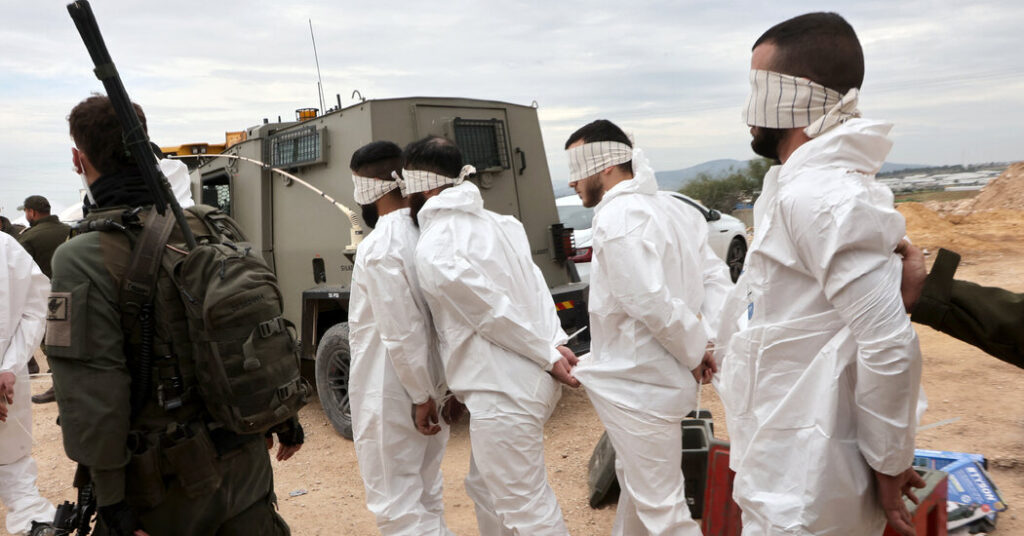In the days since a cease-fire agreement took hold in the Gaza Strip, Israel has turned its attention to a Palestinian city about 75 miles northeast of the enclave — one with a long history of resistance and militant activity.
On Wednesday, as some of its troops withdrew from Gaza, the Israeli military said it was pressing ahead with an operation in Jenin, a city in the northern part of the Israeli-occupied West Bank. The city has for decades been a hotbed of militancy and a target of raids by Israeli security forces.
Since the war in Gaza began, Hamas has been increasingly popular and asserted its presence in the West Bank. Iran — which backs Hamas and other militant groups in the region — has flooded the territory with weapons. And the Palestinian Authority, which governs parts the West Bank in coordination with Israel, has seen its tenuous influence further diminish.
Now, Israel seems to be focusing its attention on the West Bank, and Jenin in particular. Prime Minister Benjamin Netanyahu said on Tuesday that Israel’s latest operation was aimed at “eradicating terrorism” and that it would be “extensive and significant.”
Here’s what to know about Jenin and Israel’s latest operation there.
What is happening?
On Wednesday, a spokeswoman for the Israeli military said that 10 militants had been “hit” during the operation in Jenin, without giving further details. Earlier, Israel said that it had killed eight militants since the start of the raid.
The Palestinian health ministry said that 10 people had been killed in Jenin and its outskirts since the start of the raid. And Palestinian officials cited by Wafa, the Palestinian Authority’s official news agency, said that at least four people had been injured in the city on Wednesday.
Other West Bank cities were also targeted in raids. The Palestinian Authority’s commission of prisoners’ affairs said that Israeli forces had arrested at least 25 Palestinians across the West Bank since Tuesday evening.
Why is Israel targeting the West Bank?
Since the Oct. 7, 2023, Hamas-led attack on Israel, the Palestinian Authority in the West Bank has been losing support to factions like Hamas that favor armed struggle and are actively fighting Israel, according to a poll by the Palestinian Center for Policy and Survey Research.
At the same time, deadly Israeli raids and attacks by Jewish settlers on Palestinians in the West Bank have escalated. Israeli leaders say the military raids are aimed at countering terrorism in the area.
Lt. Col. Herzi Halevi, the outgoing chief of staff of the Israeli military, said in a speech on Tuesday, that his forces had killed 794 militants in the West Bank since the war in Gaza began. “In most cases, we thwarted the threat in advance before the terrorists could reach Israeli citizens,” he said.
Who is arming the militants?
Iran is operating a clandestine smuggling route across the Middle East, employing intelligence operatives, militants and criminal gangs to deliver weapons to Palestinians in the West Bank, according to officials from the United States, Israel and Iran. The goal is to foment unrest against Israel by flooding the territory with weapons, Iranian officials have said.
Israeli security forces have conducted a large-scale crackdown across the West Bank, saying that it is part of Israel’s counterterrorism efforts against Hamas and other armed factions.
What is Palestinian leadership doing?
The Palestinian Authority is the governing body in some areas of the occupied West Bank. In December, its security forces began cracking down on militants in and around Jenin, where the authority has lost control. The region is known as a stronghold for militant groups, including Hamas, calling for armed resistance to Israel.
The Palestinian Authority emerged from a peace process between Israeli and Palestinian leaders in the 1990s that was supposed to lead to the creation of a Palestinian state but never did.
In practice, the Israeli military — the occupying force in the territory — has security control over Palestinian cities. The Palestinian Authority handles some local matters, including trash collection, education, hospitals and schools, and has its own security forces who coordinate with their Israeli counterparts but has limited authority.
Jenin has long been a symbol of resistance.
The city’s reputation for resistance dates back to the 1930s, when Palestinians took up arms against British rule of Palestine during what was known as the Arab Revolt.
Later, in the wake of the 1948 Arab-Israeli war that surrounded the creation of modern Israel and the flight or expulsion of hundreds of thousands of Palestinians, Jenin cemented its reputation as a city that never surrendered when Palestinian fighters, backed by Iraqi soldiers, repelled an Israeli attempt to take it.
The city is home to one of the original refugee camps set up for Palestinians displaced by that war.
In 1967, Israel occupied the West Bank after a war with neighboring Arab states. Jenin’s resonance today, both for Palestinians and Israelis, largely stems from the second intifada, or uprising, against that Israeli occupation in the early 2000s.
Israelis recall the city as a source of dozens of suicide bombers sent into Israel at that time, and Palestinians remember a 10-day battle in 2002 between militants and Israeli forces that killed 52 Palestinians, up to half of whom may have been civilians, according to the United Nations.
Jenin has frequently been a target for raids by Israeli forces. Both Hamas, which controls Gaza, and the militant group Islamic Jihad have recruited in Jenin. And in recent years, newer militias loosely affiliated with the more established groups have emerged among a younger generation that is frustrated with a Palestinian leadership they see as corrupt and enabling of the Israeli occupation.
Lara Jakes, Raja Abdulrahim, Isabel Kershner, Erika Solomon Aaron Boxerman contributed reporting.


